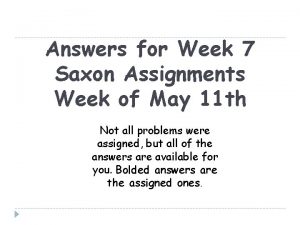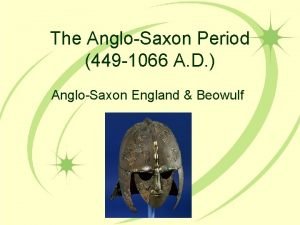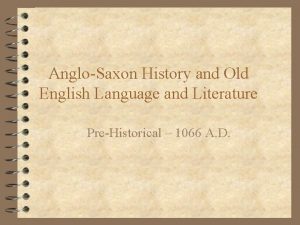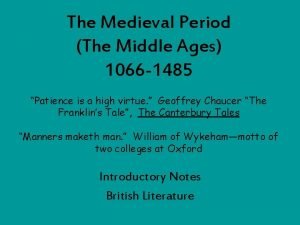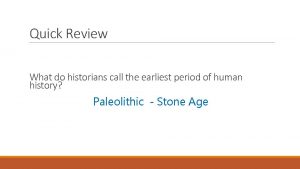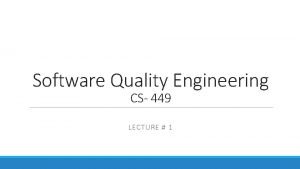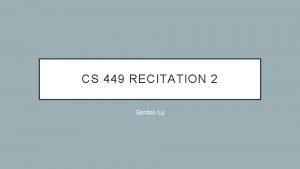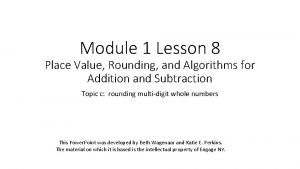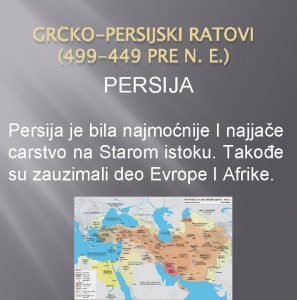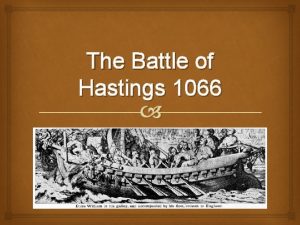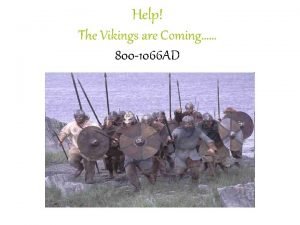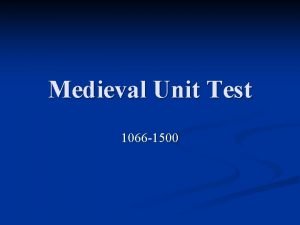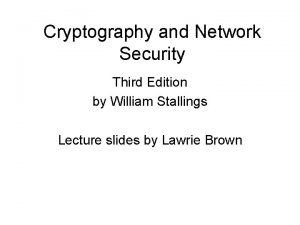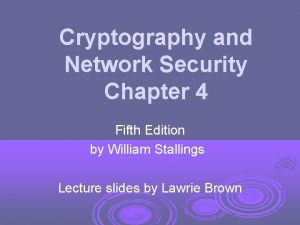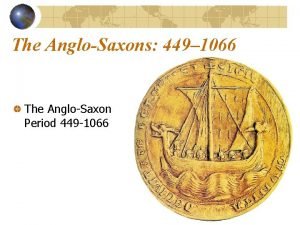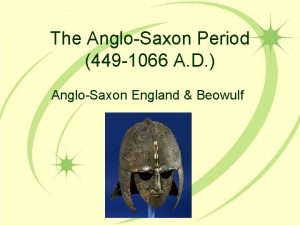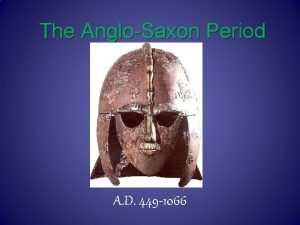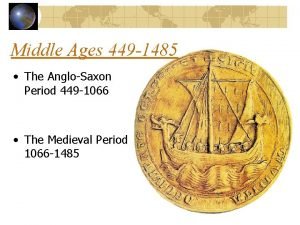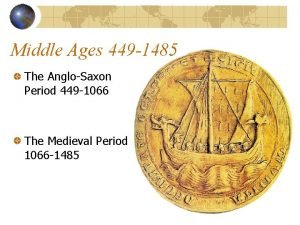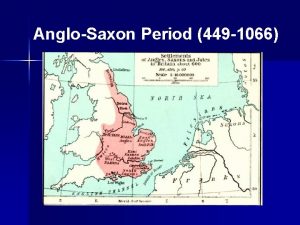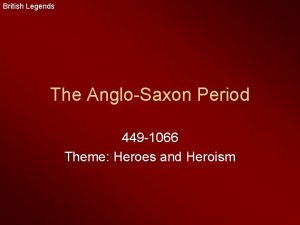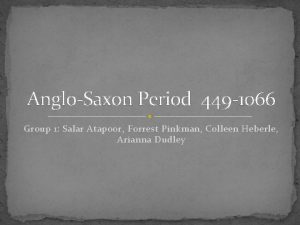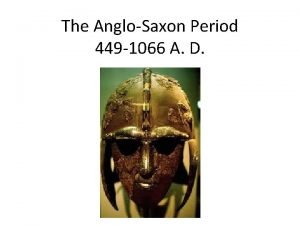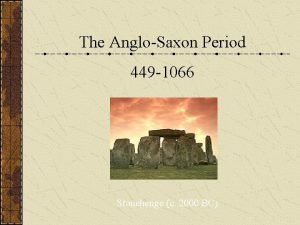The AngloSaxon Period 449 1066 Early History of




















- Slides: 20

The Anglo-Saxon Period 449 -1066

Early History of British Iles (see map pp. 12 & 13) 55 B. C. Julius Caesar tries to claim Roman authority over Britain (Celtic “Britons” live there) Agriculture & metalwork Oral tradition of literature & learning preserved by druids Century later – Romans conquer Briton, driving Picts to Scotland Gaels in Ireland

Britons under Roman Empire Cities, stone roads, written scholarship, & Christianity Protected temporarily by Roman military Approx. 449 A. D. – invasion by Angles, Saxons, & other Germanic peoples (Jutes & Frisians) Confederation of 7 kingdoms is formed (Heptarchy)

How does England Get its name? Angle kingdom has dominance “Angle-land” becomes “England, ” thus “English” people Anglo-Saxon refers to people and culture of this period

The Anglo-Saxons At 1 st: seafaring wanderers w/bleak, violent, & short lives Tribes or clans w/chieftains served for rewards & protection Pagan religion based on wyrd (fate) and admiration of heroic warriors whose wyrd was to prevail in battles Later: agricultural, less violent, more civilized, accepted Christianity (6 th c. )

Christianity grows 5 th c. – Romanized Briton Patrick converts Gaels Take Christianity to Scotland Missionaries to Picts and Angles in North 597 A. D. – Roman missionary Augustine est. monastery in Canterbury 690 A. D. – all Britain at least nominally Christian

Danish invasions 790 s - Danes (Vikings) invade Northumberland (northern England which eventually becomes Scotland) Gain control of N & E England 878 A. D. - South king of Wessex, Alfred the Great, defeats Danes 886 A. D. – Danish truce & Christian acceptance

Danish invasions, cont’d. Battles resume after Alfred’s death 1016 – Dane Canute becomes king of England 1042 – less successful king Edward the Confessor Edward’s heir: fight between Harold, earl of Wessex, and William, duke of Normandy – leads to Norman Conquest by Wm. the Conqueror 1066 Christmas – William king of Eng.

More Background… Page 31 of textbook Mead – alcoholic beverage; halls where A-S people gathered for food & fellowship

Anglo-Saxon Poetry The Epic: Told by bards or scops (storytellers; often minstrels) for entertainment & educational purposes Long, narrative poem Based on both historical fact AND fantasy

The Epic, cont’d. Male hero of noble birth & legendary status Hero’s character traits reflect society’s ideals AT THAT TIME Hero performs courageous, even superhuman, deeds Hero’s actions determine the fate of the people

The Epic, cont’d. Formal diction and serious tone Main character(s) make long speeches, often bragging about themselves

Anglo-Saxon Poetic Devices Caesura – pause dividing an Old English poetic line; modern translations lose this; replaced by punctuation (plus, we read it as prose to understand it better) Repetition of words, phrases, or ideas Ex. ll. 3, 16, 18 -19, & 273

Poetic Devices, cont’d. Kenning – descriptive phrase or compound word that replaces a noun Ex. God = Prince of Peace, Lord of Lords, Earth Creator, Ex. Bread = sandwich maker, duck food

Poetic Devices, cont’d. Stock epithet – adjective (often a hyphenated compound) pointing out special traits of persons or things Ex. Achilles in The Iliad is described as “swift-footed” Alliteration – repetition of beginning consonant sounds Assonance – repetition of beginning vowel sounds

Poetic Devices, cont’d. Synecdoche (metonomy) – figure of speech with more inclusive words replacing less inclusive words Ex. Here comes the “law. ” (policeman) OR Name of a part is used for the whole Ex. I bought some “wheels. ” (a car)

Bellwork: Think about this… Write about a time when you felt lonely or isolated. Maybe you were separated from your friends or family as a result of a move or a vacation, or maybe you simply felt alone. How did you react? With anger or with sadness? What helped you cope?

2 Types of Anglo-Saxon poetry Heroic: (epic) recounts achievements of warriors Elegiac: lamenting (mourning) deaths or other losses

Anglo-Saxon life was uncertain & difficult Disease Attacks by wild animals Storms & floods Warfare – could force families into permanent exile Men leaving to travel the seas Primitive boats Women left behind Equal intense loneliness for all

The Seafarer, The Wanderer, & The Wife’s Lament From the EXETER books (largest collection of OE writings) Authors unknown – probably more than one – Check out TONE changes All facing tests of courage All utilize poetic techniques Compare – Which of the 3 plights is the worst?
 The anglo-saxon period 449 to 1066 answers
The anglo-saxon period 449 to 1066 answers Anglo saxon runes alphabet
Anglo saxon runes alphabet Heptarchy definition
Heptarchy definition Anglosaxon history
Anglosaxon history Middle english period (1066-1500)
Middle english period (1066-1500) Old english (anglo-saxon) period (450–1066)
Old english (anglo-saxon) period (450–1066) What do historians call the early period of human history
What do historians call the early period of human history Cpsc 449
Cpsc 449 Davies v waldron (1989) vr 449
Davies v waldron (1989) vr 449 Cs 449
Cs 449 Cs 449
Cs 449 Lesson 8 use place value to round numbers answer key
Lesson 8 use place value to round numbers answer key Grcko persijski ratovi posledice
Grcko persijski ratovi posledice Fyrd battle of hastings
Fyrd battle of hastings Ul 1066 vs ul 489
Ul 1066 vs ul 489 The vikings 800 to 1066
The vikings 800 to 1066 14th october 1066
14th october 1066 Lord farkwa
Lord farkwa Middle ages unit test answers
Middle ages unit test answers Gcd(1970,1066)
Gcd(1970,1066) Gcd(1970,1066)
Gcd(1970,1066)
